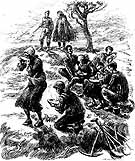
|
|
|

|

|

|

|
|
Click on an image to see a larger, more detailed picture.
|
|
|
|
|
| 1943: Death and Resistance |

|
pg. 501 |

|
|
|
|
| |
 "Life" in the Camps
"Life" in the Camps
The Nazis subjected concentration-camp prisoners to abysmal, dehumanizing conditions that weakened the body and broke the spirit. Inmates endured woefully inadequate nutrition, unpotable water, overcrowded and lice-infested barracks, unsanitary washing and toilet facilities, endless hours of exhausting labor, and--sometimes--sadistic punishments. An inmate's day began frightfully early. Fearing beatings from cursing guards, weary prisoners feverishly scrambled out of bunks, hurriedly reshaping bedding. Rushing to filthy lavatories and jostling with hundreds trying to wash from the few faucets, inmates then waited in line for "breakfast," which was often bitter coffee and a piece of bread. After a prolonged roll call, work squads formed. In some camps, work-group members were obliged to sing while marching out of camp; the camp orchestra accompanied them. Some prisoners marched up to ten miles to reach work sites. Others performed torturous, unproductive work within camp confines. In the evening, after arduous 11- or 12-hour work days, prisoners again endured a head count, standing at attention for hours, followed by "supper" and lights out at 9 p.m. Always overcrowded in barracks that often had no heating, prisoners found sleep difficult. Packed to capacity in three-tiered wooden bunks, two or three people lay in space for one--sometimes on straw mattresses, often simply on bare board; not always with blankets. Sanitary facilities consisted of urinals and latrines that were nothing more than rows of holes cut in concrete slabs above waste pipes. Washrooms held earthenware gutters with several taps drawing polluted well water. Prisoners were constantly hungry--literally starving. During mornings and evenings, the coffee was sometimes accompanied by sour, hard bread. If inmates were lucky, supper offered a few grams of stale or moldy sausage, cheese, or jam. At noon a foul-tasting, watery turnip soup--containing only traces of potatoes and barley--provided 300 to 400 calories. Often forced to eat outside in even frigid weather, prisoners had to drink the soup directly from bowls. Many prisoners resorted to rummaging through refuse bins next to camp kitchens, contracting dysentery from eating raw peelings or rotten cabbage. Some inmates stole or traded for food, risking severe punishment. Summary beatings became routine. Every SS man enjoyed the right to beat, or even kill, any prisoner. Floggings took place usually during roll call. Prisoners lay on special benches, unable to move their legs, and absorbed dozens of lashes from sticks or whips. In an extremely painful punishment called the "pillar," prisoners' hands were tied behind their backs. They were then suspended from a ceiling beam or tree by rope tied to their wrists. Equally cruel was confinement in the "standing cell." Four prisoners were jammed for days into a completely dark space of about one square yard, unable to lie down, with only a two-inch opening for air. Prisoners caught trying to escape were hanged in plain view of other inmates.
Photo: Bildarchiv Preussischer Kulturbesitz
|
|

|

|

|

|
 Early December 1943: United States Secretary of the Treasury Henry Morgenthau instructs assistants Randolph Paul and John W. Pehle to investigate the State Department's handling of the Jewish refugee issue.
Early December 1943: United States Secretary of the Treasury Henry Morgenthau instructs assistants Randolph Paul and John W. Pehle to investigate the State Department's handling of the Jewish refugee issue.
|
 December 2, 1943: 100 Jews from Vienna arrive at Auschwitz.
December 2, 1943: 100 Jews from Vienna arrive at Auschwitz.
|
 December 12, 1943: The chairman of the Jewish Council in Wlodzimierz Wolynski, Poland, the site of street massacres in 1942, assures the remaining ghetto residents that they will be safe; See December 13, 1943.
December 12, 1943: The chairman of the Jewish Council in Wlodzimierz Wolynski, Poland, the site of street massacres in 1942, assures the remaining ghetto residents that they will be safe; See December 13, 1943.
|
 December 13, 1943: The Jewish community at Wlodzimierz Wolynski, Poland, is liquidated.
December 13, 1943: The Jewish community at Wlodzimierz Wolynski, Poland, is liquidated.
|
 December 13, 1943: In Greece, Nazis murder all males over age 14 in the village of Kalávrita.
December 13, 1943: In Greece, Nazis murder all males over age 14 in the village of Kalávrita.
|
 December 17, 1943: Jews are executed at Kovno, Lithuania, as reprisal for an escape of several Jews from the ghetto.
December 17, 1943: Jews are executed at Kovno, Lithuania, as reprisal for an escape of several Jews from the ghetto.
|
 December 21, 1943: Hersz Kurcweig, a Jew, and Stanislaw Dorosiewicz, a non-Jew, escape from Auschwitz after killing an SS guard.
December 21, 1943: Hersz Kurcweig, a Jew, and Stanislaw Dorosiewicz, a non-Jew, escape from Auschwitz after killing an SS guard.
|
|
|
|
|
| 1943: Death and Resistance |

|
pg. 501 |

|
|
The Holocaust Chronicle
© 2009 Publications International, Ltd.
|
|
